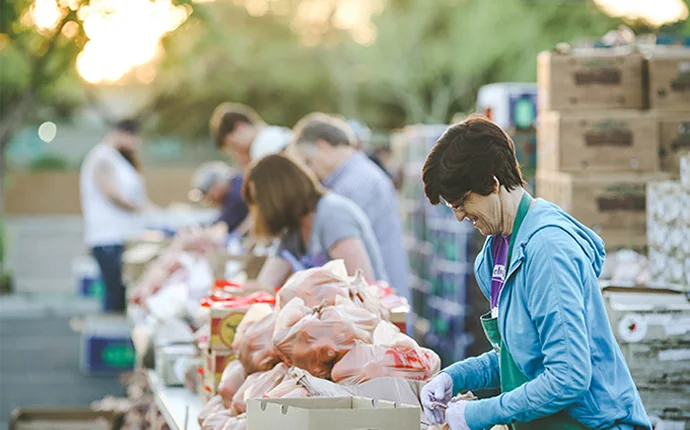
Every day in countless ways our consumer culture does its level best to make us dissatisfied. To make us feel the need for something new — something bigger, better, faster, nicer.
And we do ourselves no favors here, either. Our default setting is to live by comparison. Wanting more comes naturally to us. More than we had before and more than our friends or neighbors have.
What’s the solution to all of this “un-merry” making? Gratitude. Regularly taking stock of all that we have to be grateful for. And we don’t have to look very far for gratitude material. The sunrise and sunset. The people in our lives. Our health. Perhaps a car that gets us where we want or need to go. Air conditioning in the summer and heat in the winter. The gift of each new day. All of those many things we so easily take for granted.
Putting it in our prayers
Shortly after I became a Christian at age 29, someone taught me the ACTS “method” of prayer: adoration, confession, thanksgiving, and supplication. It was—and still is—brilliantly simple, strongly counterintuitive, and deeply satisfying. Left to our own devices, aren’t we quick to go to God with what we need or want? But the ACTS approach puts the asking last, with thanksgiving, as Paul taught, an important part of what comes first.
“Do not be anxious about anything, but in every situation, by prayer and petition, with thanksgiving, present your requests to God. And the peace of God, which transcends all understanding, will guard your hearts and your minds in Christ Jesus.” – Philippians 4:6-7.
Paul also taught an always-everywhere approach to Thanksgiving.
“Rejoice always, pray continually, give thanks in all circumstances; for this is God’s will for you in Christ Jesus.”
1 Thessalonians 5:16-18
Rejoice always? Give thanks in all circumstances? That isn’t easy, is it? It takes practice.
Making it a habit
I don’t remember when this began or how, but I’m in the habit of beginning many of my prayers with, “Heavenly Father, thank you for this day. Every day is a gift.” Sometimes it’s a heartfelt expression of gratitude because I really do see life as a gift. Other times, I have to admit, the gratitude is expressed more out of habit than heart. But even at those times, saying those words seems to reset my mind and reorient my thoughts toward all that I truly do have to be grateful for.
I know of some people who use a gratitude journal. They set aside time each day to remember and write down all that they’re grateful for. One family I know has what they call “The Blessing Box.” Throughout the year, anytime something happens that they are thankful for, they and their kids use small pieces of paper to write it down. Some unexpected blessings they experienced. Some amazing way they saw God at work. Writing it down helps them to remember. Then, at Thanksgiving, they take turns reading the notes and they give thanks for the many blessings of the year.
Keeping it in mind
I’ve read that 60 percent of us always have something in mind that we’re looking forward to buying. This isn’t necessarily a bad thing. Maybe we’ve saved for a vacation and we’re looking forward to taking it. Or we know that this weekend we’re going to buy a new suit or outfit for a friend’s wedding.
But I wonder how much of all that looking forward to buying something is an expression of discontent. And how much of it just leaves us on the treadmill of wanting something, looking forward to buying it, actually buying it, enjoying it for a while, all-too-soon not being so happy with it anymore and wanting something else, and then repeating the cycle. The fancy term for that is the hedonic treadmill.
One of the strongest antidotes to our dissatisfaction machine consumer culture is gratitude. The culture doesn’t know what to do with someone who’s thankful for all that they have. There’s no room in the heart of a grateful person for the lie that something will make them happy.
What if instead of always having something in mind that we want to buy, we always have something in mind that we’re grateful for?
Matt Bell is the author of Trusted: Preparing Your Kids for a Lifetime of God-Honoring Money Management. He speaks at churches and conferences throughout the country and writes the MattAboutMoney blog.
This article should not be considered legal, tax, or financial advice. You may wish to consult a tax or financial advisor about your individual financial situation.



